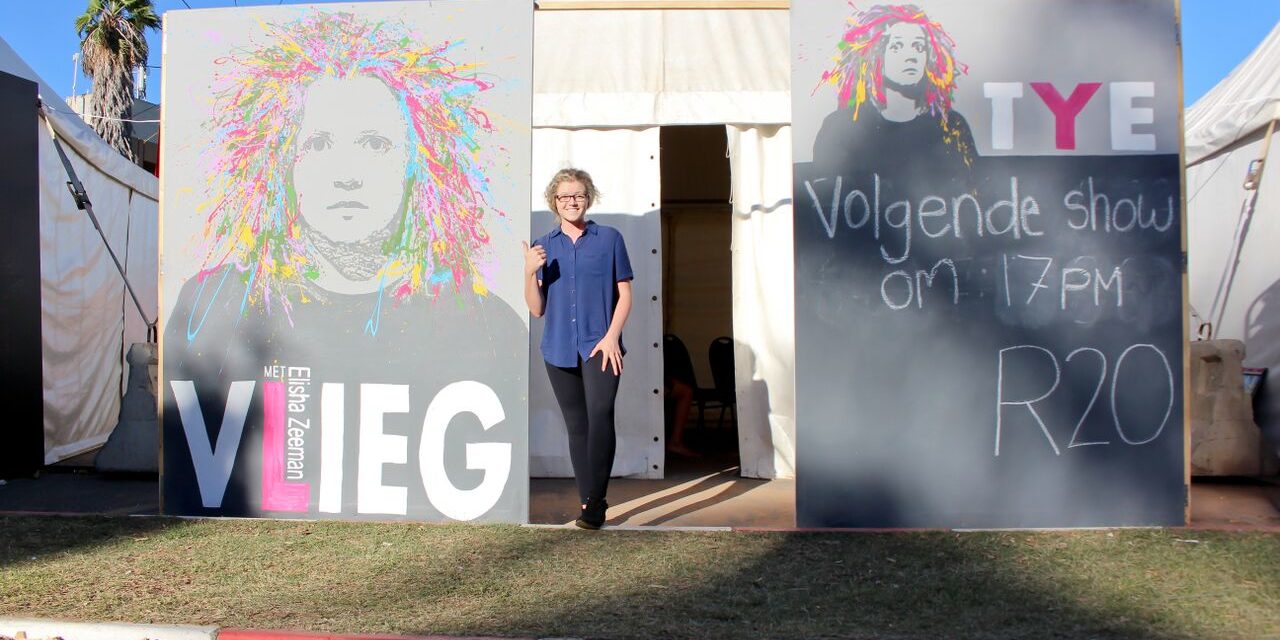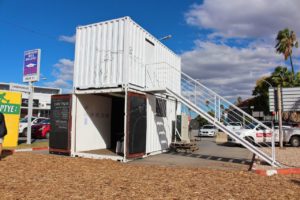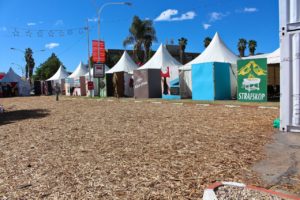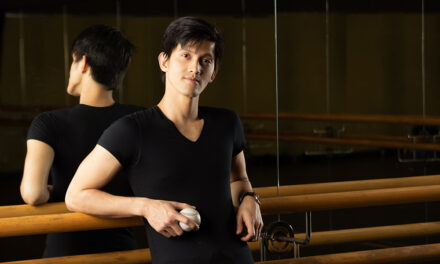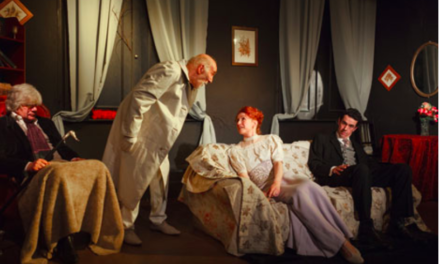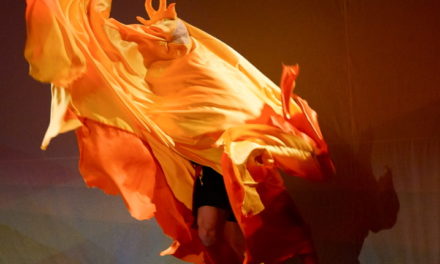The 22nd Klein Karoo National Arts Festival (KKNK), presented by Kunste Onbeperk (Arts Unlimited), took place between 24 and 30 March 2016. The festival is a highlight on the South African arts calendar, presented annually in Oudtshoorn in the heart of the Klein Karoo.
The first KKNK took place in 1995, and it has since grown to become one of the largest arts festivals in South Africa. This annual festival has built a reputation for presenting cutting-edge work and it produces several theatre productions, music events, and visual arts exhibitions each year. The festival has stimulated new writing and creativity, especially in Afrikaans. Afrikaans is one of South Africa’s eleven official languages and one of the most spoken languages in the country. Over the past two decades, the festival has made a tremendous impact on the industry, creating work for thousands of artists and entrepreneurs in South Africa. It also has a huge economic impact on the Klein Karoo, creating work for many residents. The economic impact on the Oudtshoorn Municipal area is an estimated R64, 7 million; and between R170 million and R188 million annually in the Western Cape Province. The festival is a multi-racial celebration of South African arts and culture, attracting a predominantly Afrikaans-speaking audience of all races (85% of the audiences). The age groups vary with 19% between the age of 51 and 64; 25% between the ages of 36 to 50; 22% between the ages of 26 and 35 and 28% between the ages of 18 and 25.
Kunste Onbeperk, the parent body of the festival, is a non-profit organization that aims to stimulate and support the South African arts industry, artists and culture through initiating different projects and initiatives, mainly through Afrikaans. The organization annually presents the KKNK, Klein Karoo Klassique, and several art industry-related workshops, seminars, and other projects.
A new initiative at this year’s festival was “Uitkampteater” (tent theatre), the first theatre event of its kind in South Africa. The concept is based on Tentjestheater, presented at Theaterfestival Boulevard (a festival annually presented in Den Bosch), and programming offered at De Parade, a traveling festival, in the Netherlands. The concept involves short performances in small pop-up venues, such as tents or containers, where a variety of art forms are presented.
Kunste Onbeperk adapted the concept and presented a small festival of ten curated performances –two Dutch and eight original South African productions. It was supported by the Royal Dutch Embassy, Pretoria, the Theaterfestival Boulevard, and the National Lottery Distribution Trust Fund.
In an interview with the ambassador of the Netherlands in South Africa, Ms. Marisa Gerards, and Kunste Onbeperk’s CEO, Rhodé Snyman, they discussed how this idea came about during Ms. Gerards’ first visit to the festival in 2015. The Ambassador said that “the KKNK reminded me a little bit of the Tentjestheater of strolling outside, you meet your friends, you eat something … you see a performance, so we said it would connect really really well”. She added that it was wonderful that Snyman could visit the Netherlands to experience the Tentjestheater for herself and to see how the concept can be used at the KKNK.
Victorien van Hulst, the artistic and business director of Theaterfestival Boulevard, mentioned in her speech at Uitkampteater’s opening ceremony on 23 March 2016 at the festival that she regards Uitkampteater “as the new baby sister to our Tentjestheater.” She also gave some background on the Theaterfestival Boulevard which started thirty-two years ago and the purpose of Tentjestheater: “The tent as a playground. Audiences were lured in by the artists. They were generally treated to brief shows. Many of them with lots of laughter. Some expressing a spirit of anarchy. The tent is a free space, a place for research and experimentation. But especially: a place where audiences displayed their great openness and curiosity. A formula for success. This was clear from the start.”
The project was launched to not only create a platform for emerging artists at the festival (and beyond), but to create an artistic space for artists to experiment and test new work. The initiative challenges artists to transcend the limits of genre, focus on conceptual innovation and bring ideas to life by incorporating a variety of artistic skills. Uitkampteater also often brings ill-supported genres to the festival and encourages festivalgoers, who would otherwise not support these genres, to engage with these short bites of theatre. In doing so, the festival aims to grow audiences across a range of genres. Tickets were priced at R20 to promote affordability and audiences could not pre-book for performances to ensure accessibility. The performers received the main percentage of total box-office income.
The productions were presented in nine tents (4 x 4 meters) and a shipping container, with an intimate capacity of between 15 to 25 seats. It was situated outside the Civic Centre, one of the main and popular venues at the festival. Each production was allocated a tent (Ivory Tower, a Dutch production, was presented in a container), which artists could decorate inside and outside according to the theme of their production. This contributed to attracting audiences and added to the ambiance of the festival.
All productions had a duration of between 15 and 20 minutes, and each performance was scheduled in a manner that allowed half of the performances to start on the hour and the other half starting 30 minutes later. This scheduling allowed audiences to move easily from one production to the other and see some performances in a short space of time.
Participants were not only involved as performers, but they also took responsibility for the design and decoration of their performance space, the marketing of their productions, and the administration of the box-office sales at the door. The current economic climate in South Africa compels artists to be multitalented, navigating artistic and business aspects. In effect, most artists are self-employed and establish small companies to create their own work and generate income.
It was imperative for each production to use creative direct marketing in-between performances to attract audiences for each performance. This strategy not only forced the emerging artists to think creatively about the marketing of their shows, but the creativity spilled over into the streets, adding colorful and festive elements to the festival as a whole. These skills are essential in an industry that is challenging and where artists also need to take on the roles of marketers and producers. Uitkampteater is a less costly way for artists to present their work and be exposed to a wider audience. Within an environment of low risk and high support, it offered participants an opportunity to interchange roles and assess the progress of their production on offer.
The ten curated performances incorporated different genres, which included cabaret, dance, comedy, drama, a talk show, music, and visual arts. Two flagship productions from Theatrefestival Boulevard were chosen as cornerstone productions for the first year. The other eight productions were developed from proposals from young emerging talent and more established young artists.
The following productions were presented:
Ivory Tower with Dutch artists Jacqueline Hamelink and Miesjel van Gerwel, who presented a unique combination of improvised music and visual arts. The audience participates by volunteering words and emotions, which form the basis of each performance. The audience also chooses which artist will lead – the musician or the visual artist. Using the words given by the audience, the musician and artist create improvised music and a painting inspired by the audience. The process of the creation of the painting is projected on a back wall for the audience to see. It is a 20-minute collaboration where the audience also becomes part of and experiences the artistic process.
This company preferred a different space from the small tents, which they feel create more variety and innovation within the short-art concept. Two containers were put on top of each other, with space below used as a pop-up art gallery and the box-office space. Audiences would then walk up the stairs to the intimate creative space of the performance on the top level.
The other Dutch performance was Wild Guest, a talk show presented by Oscar Kocken and Patrick Nederkoorn. It is a talk show with a difference, as their marketing slogan explains: “100% Celebrity Free.” They take turns as presenters of the talk show and operating and managing visuals and music during the show. An audience member is randomly picked to be the main guest. The audience will then experience a spontaneous conversation about this unknown person’s past, present, and future, while (surprisingly) accurate images from their lives appear on the screen. It is a spontaneous interview, which looks at the importance of the everyman and how everyone has an interesting story to tell. It investigates and challenges all aspects of society, cultural differences, and more importantly similarities.
The South African productions included a comedy – inspired by the Commedia dell’arte style – by the award-winning writer and performer Wessel Pretorius, titled Klara Maas se hart is gebreek (Klara Maas’ Heart Is Broken). Using the genre’s archetypes, it tells the heart-warming tale of Klara Maas, with emerging actor David Viviers playing Klara Maas’ tear.
Two cabarets were also included in the line-up, Valencia and Vlieg (Fly). Valencia, hard-hitting commentary on racial stereotypes and politics in South Africa, featured the emerging talent of Faith Kinnear portraying different characters and Pieter Odendaal on the keyboard. Elisha Zeeman’s Vlieg was a satirical look at South Africa with her as the proverbial fly on the wall from the perspective of different characters and objects.
Another exciting addition to the line-up was from the young theatre-maker Jason Jacobs, who directed Dustin Beck in Stof rooi (Dust Red) – dance improvisation with the spoken word. It follows the incarnations of a young gangster and how he taps into his imagination and recollects what he claims as lost. It is a moving coming-of-age dance ritual, which challenges and questions the male role models in a multicultural society.
More commercial productions were also part of the selection. The young award-winning theatre-maker Jannes Erasmus presented two comedies, Kniediep (Knee-deep) and Strafskop (Penalty Kick). Kniediep is a satirical look at an extravagant young man’s audition for a TV cooking show (performed by Erasmus), and Strafskop was a satirical look at rugby and the ritual of a braai (barbeque) in South Africa, with emerging actors Deanre Reiners and Piet Matipa. Wees gewaarsku (Be Warned) was a collaboration with student actors Ian van der Westhuizen, Du Toit Albertze, and Arno Daiber, which is an energetic Quentin Tarantino-style comedy looking at stereotypical South African festivalgoers and how they relate to art and to one another.
The other work was Affie kleinplaas (From a Small Farm) (featuring Llewelyn Bond and Samuel Jumat), the winner of the Regional Eden Drama Competition of the Western Cape Department of Cultural Affairs and Sport. It is a heart-warming tale of two innocent farm boys and focuses on the life of farmworkers in South Africa.
This first trial run of Uitkampteater and short art at the festival was received with great enthusiasm and praise by critics, theatre professionals, and the public.
Theatre critic Laetitia Pople (Die Burger, 25 March 2016) expressed the hope that Uitkampteater will become an institution at the festival and said that this is the reason why people visit festivals – to be challenged to move beyond their comfort zones and to have rare experiences that challenge their views on life.
In an article written for the Maandblad Zuid-Afrika Ilza Roggeband comments: “If you listen to festivalgoers, it (Uitkampteater) was a welcome addition to the festival. It had people talking. Wherever you went you heard people asking: ‘Have you been to Uitkampteater?’ and then there were long discussions about the highlights and the new talent they saw” (p. 108, May 2016).
Playwright, producer, and director Hennie van Greunen said the initiative was a wonderful opportunity for emerging and more established artist to “showcase their goods”. According to him, it is like speed-dating where artists can present their work and talent to new audiences. He called the concept innovative, unique, and complimented the combination of local and international theatre (Maandblad Zuid-Afrika. May 2016, p. 108).
Artistically the success of the initiative was acknowledged with David Viviers being nominated for a Kanna for Best Emerging Artist for Klara Maas se hart is gebreek. The production finally won the Kanna Award for Best Debut Production. The Kanna Awards are prestigious national prizes presented annually by the KKNK.
The organizers observed several advantages to the project. In previous years the winners of the Regional Eden Drama Competition would be scheduled in an indoor venue for one or two performances only, resulting in poor attendance because they have to compete with the professional productions at the festival. The poor attendance was no reflection on the quality of the work. With the 2015 winner, Affie kleinplaas, scheduled as part of Uitkampteater, the production was performed 35 times, with many of the performances sold out. Uitkampteater can become a great platform for artists and they can possibly earn more income by presenting their work in this manner, than they would if presented as part of the general program, mainly consisting of professional work.
The intimate space creates direct contact and feedback from the audience. It brought the audience and performers closer together. This immediate and direct feedback was put to good use by improving and shaping their productions during the week. It became a constant process of engagement between audiences and performers.
From an audience perspective, it offered intimate experiences and short bursts of theatre that could easily be incorporated into their formal program schedule. Because of its proximity to the festival grounds and that no pre-bookings were allowed, festivalgoers could decide on the spur of the moment to attend a performance. And the affordability of R20 a ticket definitely encouraged festivalgoers to take a chance on unknown work and artists.
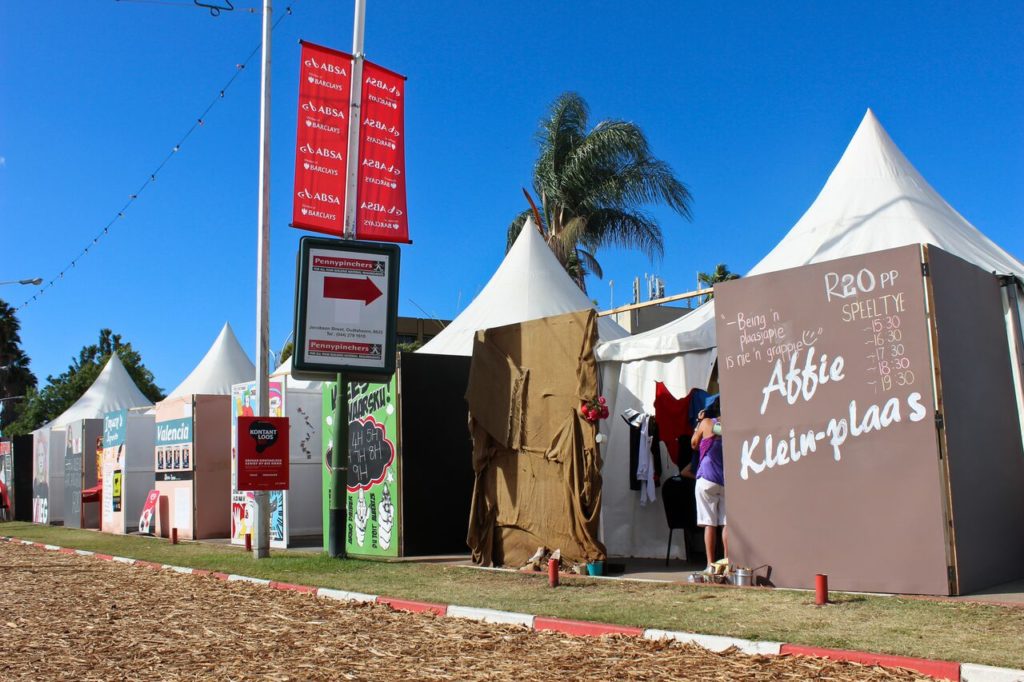
Uitkampteater, March 2016
After its huge success and positive reception, the KKNK would like to expand the concept – not only at the 2017 festival but to encourage other festivals to follow suit. This process could evolve into a circuit for short productions and also create more opportunities and platforms for emerging artists. There are also opportunities for this concept to be introduced at the different weekend markets all over South Africa.
The 2017 Festival will take place between 8 and 15 April, and the KKNK will continue to encourage theatre-makers to participate in this project. The content will be expanded to include more genres, languages and there will also be a focus on theatre for young audiences.
The festival will also launch a competition for drama students, culminating in a showcase of the best proposals from each tertiary institution. It is an excellent opportunity to introduce students to the art festival scene, the industry and to encourage creativity and entrepreneurship. Uitkampteater is, however, not only for emerging artists. It should also be seen as a playground for established theatre- makers to play with new ideas and create innovative work.
Kunste Onbeperk, the company that presents the KKNK, is very passionate about initiating new projects and develops various programs that are presented in Oudtshoorn and all over South Africa all year round. Part of the success in transforming and diversifying audiences at the KKNK is due to a very active and compassionate resident of Oudtshoorn. Rhodé Snyman, CEO of Kunste Onbeperk, stated that innovation (at festivals) is important, not because you feel threatened, but to stimulate creativity, support emerging artists, develop new work and build new audiences (Maandblad Zuid Afrika. May 2016, p. 108).
Uitkampteater is an example of the spirit of the organization and its commitment to provide economic opportunities, especially for young performing artists, and to create exciting and new content for audiences.
This post was written by the author in their personal capacity.The opinions expressed in this article are the author’s own and do not reflect the view of The Theatre Times, their staff or collaborators.
This post was written by Marié-Heleen Coetzee.
The views expressed here belong to the author and do not necessarily reflect our views and opinions.

